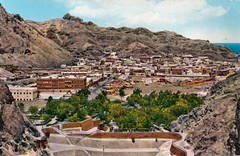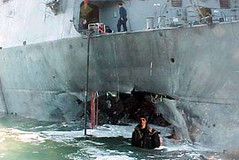 |
The area of Aden known as the crater by JamesGardinerCollection by JamesGardinerCollection |
While I was still in England, I called the embassy to provide the general services officer with my flight arrangements in order to be sure one of the drivers would be at the airport to pick me up. I was surprised when the operator told me the GSO wasn't in the office. Instead of recognizing this sign that things had changed radically, I was distracted by the fact that he had just returned to Yemen from Germany before I left for Hungary. My first thought was that he had taken leave again. Not a very generous conclusion.
When I arrived back in Yemen, I didn't recognize the driver who picked me up in one of the oldest vehicles I had seen in the city. Still I didn't recognize the signs. It took going into the embassy and learning that all the embassy's drivers and the reliable vehicles had been sent to Aden along with nearly half the American staff for me to realize that normal was gone.
The GSO, David, was in Aden. The ambassador was in Aden. The Defense Attache was in Aden. The deputy consul was in Aden. And Aden was full of hundreds of official Americans, many from the military, many investigators, many security, many from intelligence. Too many for the number of hotel rooms available. Hotel managers started asking their non-American guests to move to other hotels so that whole floors could be made available to the influx of Americans. Hotel rooms became both sleeping quarters and offices. Furniture was moved around and equipment installed, not always after obtaining, or even requesting, hotel management's approval.
 |
Aden with harbor in the background by ninjawil by ninjawil |
The security experts who accompanied the investigators started expressing concern about the need to make the hotel secure enough for work to continue. That led to further security measures being implemented to the dissatisfaction and inconvenience of the remaining non-American guests of the hotel. Within a few weeks, the entire cast of Americans moved to a different hotel, one where the road in and out could be controlled without inconveniencing anyone else. The hotel was the only building at the end of the road and the Americans were the only guests at the hotel.
Cynthia, my sponsor and frequent companion during my first five weeks, volunteered to be the administrative officer for the operation in Aden and ended up spending nearly all the rest of her tour there. The financial management officer also ended up going to Aden for an extended time. GSO David spent time in Aden, time in Sanaa, and time with his wife outside of Yemen. Then in December, he resigned. Those changes meant the consular section had only one full-time officer instead of two full-time and one part-time, and the administrative section had one full-time officer instead of three.
At first, we kept thinking things would soon get back to normal. So we kept at it. I don't recall if we first asked for help or if the Department realized we needed help and offered it. A series of TDY staff came to help not just those of us with State but all the other agencies as well. Conference rooms became dormitories as people worked around the clock. Within a few months, there was talk back in Washington that every Diplomatic Security officer in Washington had already done a TDY stint in either Sanaa or Aden. The NCIS officer who was one of my Arabic language classmates and was assigned to Bahrain came to Sanaa for a few-week TDY stint. We started looking around Aden to see if we could locate office space to set up a more permanent location in the city. At one point we were able to get into the building that had been the U.S. consulate in Aden before the People's Democratic Republic of Yemen (PDRY) was established in the early 1970s. A safe, still locked, was found in one of the rooms, offering us tantalizing thoughts about what might be in it.
Six months after the attack on the Cole, we started talking about defining what the new normal was. We asked the regional psychiatrist and a facilitator from the Foreign Service Institute to lead an offsite discussion of what we needed to do to adjust to the changed situation. It was a step towards acceptance. But from all I have seen and heard about the situation in Yemen now, that new normal keeps shifting. In 2004 I was able to go back to Sanaa for a week and saw that morale had suffered greatly. Everyone at the embassy was looking forward to meeting me because they knew I had enjoyed my time in Yemen and none of them were enjoying it. If I were dropped back into Sanaa today, I don't think I would recognize the place.
Less than a month after the offsite, the entire operation in Aden was abandoned based on the FBI's assessment that it was no longer safe for its staff to remain there. And normal kept shifting.
Less than a month after the offsite, the entire operation in Aden was abandoned based on the FBI's assessment that it was no longer safe for its staff to remain there. And normal kept shifting.



